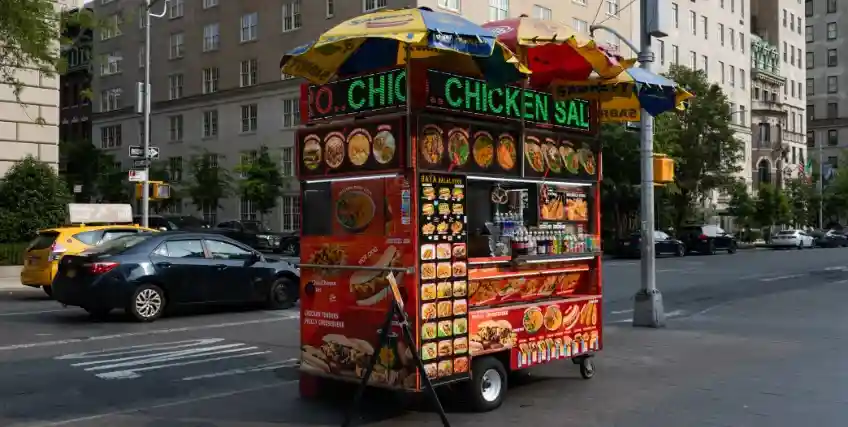Looking for Business Financing?
Apply now for flexible business financing. Biz2Credit offers term loans, revenue-based financing, lines of credit, and commercial real estate loans to qualified businesses.
Set up a Biz2Credit account and apply for business financing.
Key Takeaways
-
Mobile vendor financing helps small business owners fund carts, food trucks, trailers, and mobile kitchens without draining savings.
-
There are multiple mobile cart financing options available such as, term loans, equipment financing, and business lines of credit.
-
Having a strong credit score, solid business plan, and steady cash flow improves eligibility chances for better loan terms.
Smart mobile vendor financing choices support business expansion, equipment upgrades, and smoother working capital management.
Small business owners running a mobile cart or food truck business in the U.S. is exciting but often demanding. Many entrepreneurs often start small, turning their passion for food service into a thriving business on wheels. But growth requires capital. When running a mobile cart, whether it’s a coffee cart, dessert cart, or retail kiosk, the expenses for equipment, refrigeration units, point-of-sale systems (POS), fuel, or inventory all add up quickly.
Mobile vendor financing is a flexible funding path that helps food truck owners, cart vendors, and food trailer operators manage upfront costs, buy equipment, and maintain steady cash flow. However, it’s important to understand the different types of financing options to remain in this competitive market.
In this article, we’ll understand all about mobile vendor financing, why is it important, how it fuels growth, and the different types of loan options available.
What Is Mobile Vendor Financing?
Mobile vendor financing refers to financial solutions that are designed for small mobile businesses. These might include coffee carts, retail kiosks, dessert carts, or full-service food trucks. Unlike traditional financing options that often cater to brick-and-mortar setups, mobile vendor financing focuses on mobility-driven entrepreneurs. It helps business owners cover upfront costs, manage working capital, and expand their mobile food business or other businesses without straining cash reserves.
Food truck owners or mobile cart vendors can access various loan options such as SBA loans, equipment financing, business lines of credit, or short-term working capital loans. These financing products are offered by lenders who understand the unique needs of mobile operations, from refrigeration upgrades to point-of-sale systems. In short, mobile vendor financing gives small business owners the flexibility to fund operations, purchase essential tools, or expand the cart fleet while keeping cash flow healthy.
Why Cart Vendors Are Turning to Mobile Vendor Financing
Across the U.S., mobile cart vendors and food truck owners face one common challenge: finding the right financing option to match their business model. From startup costs and equipment expenses to working capital and daily operations, funding can make or break business growth.
Many small business owners now prefer mobile vendor financing because it covers everything they need, all in one place. This financing option isn’t limited to equipment financing and also includes traditional business loans, and merchant cash advances. This flexibility allows cart vendors to access lump sum funds for expansion or draw smaller amounts as needed.
Another reason for this shift is accessibility. Traditional lenders often hesitate to approve mobile-based businesses due to variable sales. However, specialized providers who understand the mobile cart business now offer financing solutions designed around seasonal cash flow. In short, mobile vendor financing gives cart vendors breathing space to grow at their own pace.
How Mobile Vendor Financing Fuels Growth
Business growth often relies on opportunity and having the right financing at the right time. So, here’s how mobile vendor financing fuels growth for cart vendors:
Upgrades and Expansion: Cart owners can invest in new mobile kitchens, add vehicles or purchase advanced refrigeration units.
Improved Cash Flow: Financing options such as working capital loans or business lines of credit help maintain cash for supplies and fuel.
Easier Budgeting: Business funding offers predictable monthly payments that help simplify expense tracking and manage loan amounts effectively.
Faster Funding Decisions: Compared to traditional small business loans, many financing solutions for vendors have a shorter application process and quick decisions.
Types of Loans for Mobile Vendors
Cart and food truck vendors today have more loan options than ever before. Here are the most common types that help fund small and mobile businesses.
- SBA Loans
- Term Loans
- Equipment Financing
- Business Line of Credit
- Working Capital Loans
SBA loans are offered by the U.S. Small Business Administration and are one of the popular loan options for small business owners. These loans come with flexible loan amounts, lower interest rates, and longer repayment terms for qualified applicants. Mobile cart owners can use SBA loans to purchase vehicles, invest in supplies, or manage day-to-day operational costs. SBA microloans are another option perfect for startups, offering loan amounts up to $50,000.
Term loans are traditional funding options that offer a lump sum loan amount upfront. These loans can be repaid over a set period of time and often come with predictable monthly payments. Mobile cart vendors can use term loans for upgrading a food trailer, purchasing essential equipment, or financing vehicles.
Equipment financing is designed for purchasing business assets such as tools, technology, or machinery. Instead of paying upfront for the equipment, mobile cart owners can pay in easy monthly payments. Also, the equipment itself serves as collateral. Equipment financing for small businesses can be used to purchase refrigeration units, grills, or point-of-sale systems. Some mobile cart owners can also consider equipment leasing option that helps manage upfront costs and avoid large payments.
A business line of credit is a flexible funding option that offers quick access to funds up to a pre-approved credit limit. Business owners can borrow funds when needed, repay, and use them again. Also, the interest only applies to the loan amount used. This option is ideal for short-term business expenses such as equipment repairs and managing cash flow fluctuations in seasonal vending operations.
Working capital loans are short-term loans that help cover equipment repair costs, payroll, and inventory. These loans help maintain business stability during slow months.
Tips to Qualify for Mobile Vendor Financing
To qualify for mobile vendor financing, business owners need to have strategic planning with strong preparation. Here’s how to improve your chances of loan approval.
- Build a Strong Business Plan
- Check Your Credit Score
- Prepare Financial Documents
- Determine Funding Needs
- Compare Lenders and Loan Terms
- Complete the Application Process
Draft a detailed business plan outlining the concept, target market, and revenue projections of the business. Because lenders want to see clear plans before approving a business loan.
Having a healthy FICO score increases loan approval odds. So, review your credit history and fix any errors before applying for loans. Even those with bad credit can explore microloans or SBA loans with additional documentation.
Gather all the necessary documents such as tax returns, bank statements, and bank records. These show lenders your cash flow and repayment ability.
Calculate how much you loan amount you need for purchasing equipment or working capital. Also, avoid borrowing more than your business can handle.
Different providers offer different types of loan terms and interest rates. So, it’s better to compare and find a balance between flexibility and affordability.
Once you’ve decided which loan option is suitable for your business, submit all required documents and wait for the approval process to finish. If approved, review the repayment terms carefully before signing.
The Bottom Line
The mobile cart vending business scene across the U.S. continues to thrive. From food trucks to mobile kitchens, more small business owners are realizing the potential of flexible financing options.
With the right mobile vendor financing option, business owners can not only cover startup costs but also keep cash flow steady. This helps business operations run smoothly and support long-term growth.
So, if you’re a cart or food truck owner looking to expand, it’s time to explore cart financing options. Review different types of loan options, assess your eligibility, and choose financing solutions that fit your business vision.
FAQs About Mobile Vendor Financing
1. What is mobile vendor financing?
Mobile vendor financing includes business loans, SBA loans, equipment financing, and credit lines that support mobile cart and food truck owners. It helps cover upfront costs, equipment upgrades, and day-to-day cash flow needs. It also gives small business owners flexible ways to fund growth without heavy pressure on savings.
2. Can food truck owners qualify with bad credit?
Food truck owners with bad credit have many loan options to choose from. Microloans, merchant cash advances, and some short-term products focus more on sales than scores. Therefore, having a strong cash flow and consistent business activity improves loan approval chances.
3. What loan options work best for mobile food businesses?
The most common options include SBA loans, term loans, equipment financing, and business lines of credit. Each option supports different needs such as equipment costs, working capital, or expansion. Hence, the right choice depends on your revenue pattern and planned use of funds.
4. How much of a down payment is required for mobile vendor financing?
Down payments vary by lender and loan type. Some equipment loans need little to no upfront payment. While traditional business loans may require more, strong credit and steady cash flow help reduce that amount.
5. How do lenders decide loan amounts for cart vendors?
Lenders look at cash flow, credit history, and revenue consistency. They also assess your equipment needs and business plan. Having higher FICO scores and proven sales often unlocks larger loan amounts.




